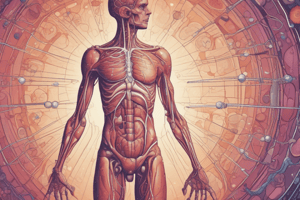Podcast
Questions and Answers
What is the primary function of the lymphatic system?
What is the primary function of the lymphatic system?
- To regulate body temperature
- To aid in the digestion of nutrients
- To produce immune cells
- To carry excess fluids to the bloodstream and filter pathogens from the blood (correct)
What is the difference between innate and adaptive immunity?
What is the difference between innate and adaptive immunity?
- Innate immunity is specific to a particular pathogen, while adaptive immunity is non-specific
- Innate immunity is non-specific, while adaptive immunity is specific to a particular pathogen (correct)
- Innate immunity is active, while adaptive immunity is passive
- Innate immunity is passive, while adaptive immunity is active
What is the role of the humoral response in immunity?
What is the role of the humoral response in immunity?
- To regulate body temperature
- To aid in the digestion of nutrients
- To produce antibodies to fight infection (correct)
- To activate immune cells to fight infection
What is the role of the cell-mediated response in immunity?
What is the role of the cell-mediated response in immunity?
What is the function of lymph nodes in the immune system?
What is the function of lymph nodes in the immune system?
What is the result of the inflammatory response?
What is the result of the inflammatory response?
What is the role of the lymphatic system in the immune system?
What is the role of the lymphatic system in the immune system?
What is the difference between innate and adaptive immunity in terms of specificity?
What is the difference between innate and adaptive immunity in terms of specificity?
What is the role of the lymphatic vessels in the immune system?
What is the role of the lymphatic vessels in the immune system?
What is the result of the immune system's response to infection?
What is the result of the immune system's response to infection?
Flashcards are hidden until you start studying
Study Notes
Lymphatic System and Immunity
- The lymphatic system helps maintain fluid balance, contributes to lipid absorption in digestion, and plays a crucial role in immunity.
- Lymphatic vessels start as small dead-end tubes called lymphatic capillaries, found near blood capillaries.
- When blood passes through blood capillaries, some fluid moves into the interstitial space between cells, allowing nutrient and gas exchange.
- About 10% of the fluid doesn't get reabsorbed into the blood and is instead absorbed by lymphatic capillaries, which are very permeable, allowing anything in the interstitial fluid to enter the lymphatic system.
Lymph Nodes and Immune Response
- Lymphatic capillaries join to form larger lymphatic vessels, which lead to lymph nodes, round or oval-shaped bodies that contain macrophages and lymphocytes (B and T cells).
- Fluid enters and leaves lymph nodes via lymph vessels, and as it passes through, it comes into contact with immune cells that trap and recognize pathogens, triggering an immune response.
Lymphatic System and Cancer
- Lymphatic vessels can also transport cancer cells that leave a primary tumor, which is why "draining lymph nodes" are often checked for cancer cells that have spread around the body.
Innate and Adaptive Immune Responses
- The immune system protects against infection through physical barriers (skin and mucous membranes), an immediate but non-specific innate response (inflammation), and an adaptive immune response that adapts its response during infection and retains immunological memory.
- The adaptive immune system has a faster and stronger response next time the body encounters the same pathogen.
Studying That Suits You
Use AI to generate personalized quizzes and flashcards to suit your learning preferences.




